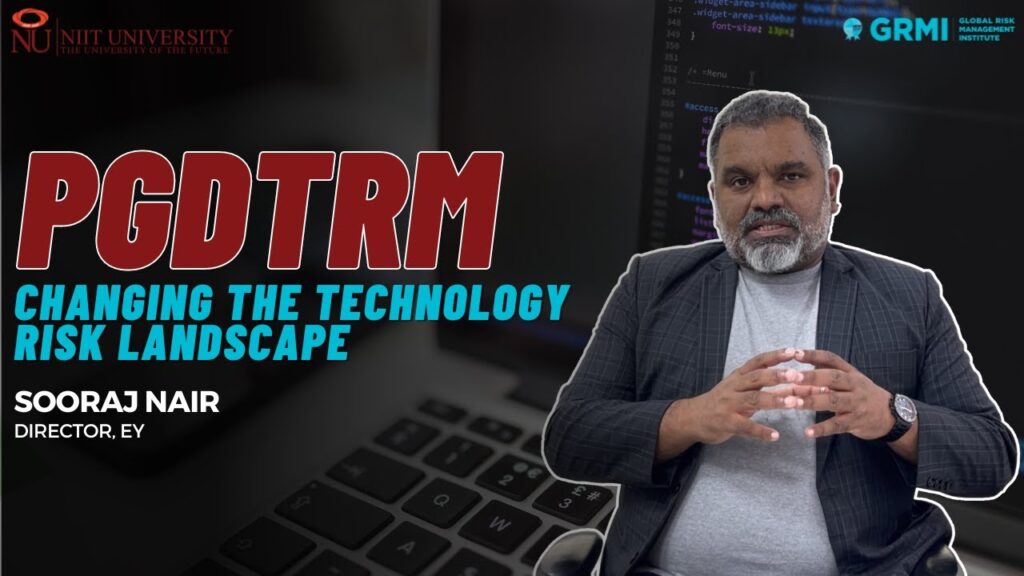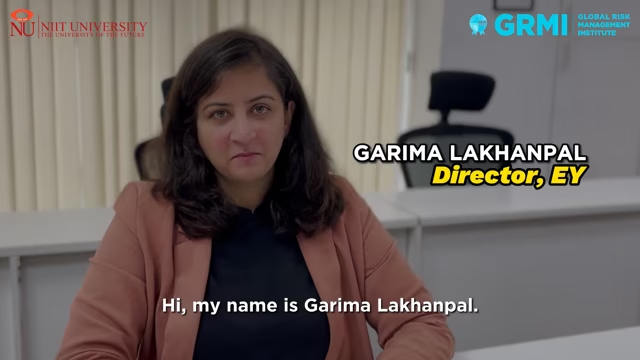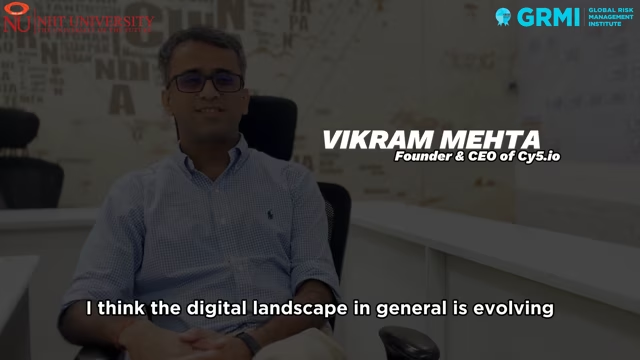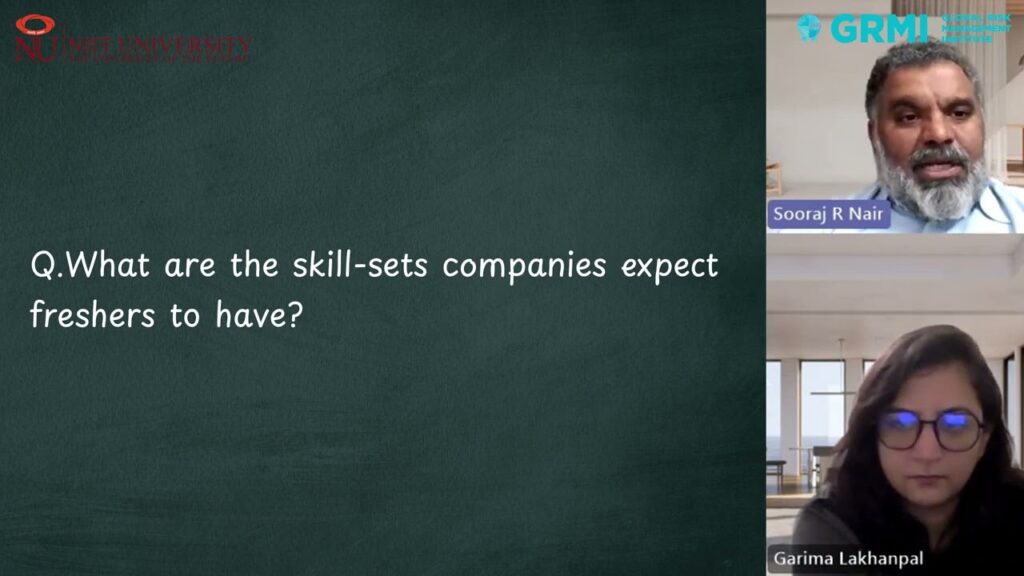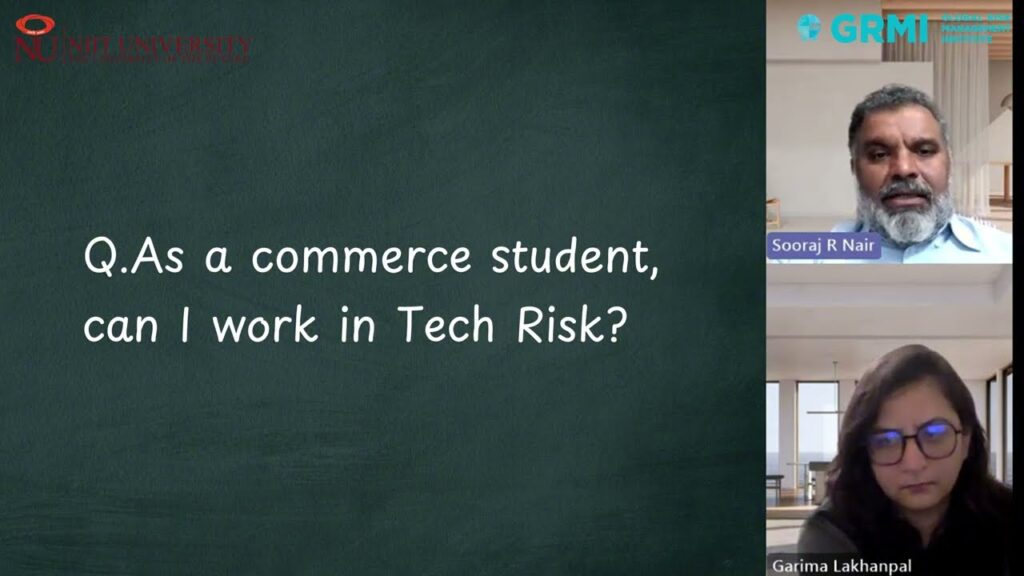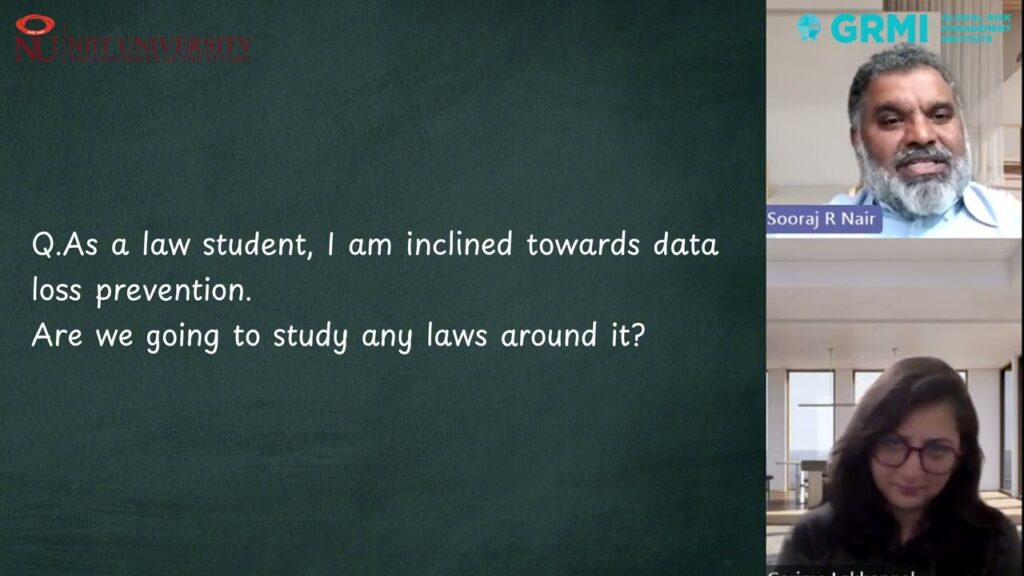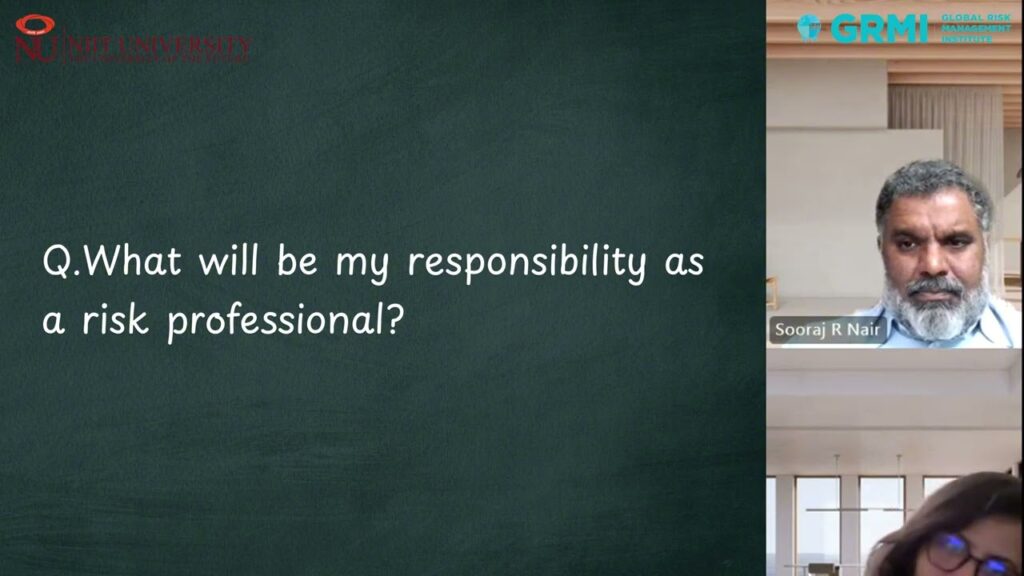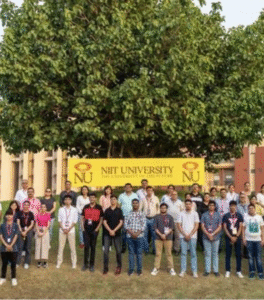1-Year PG Diploma in Technology
Risk Management
Specialized Course in Cybersecurity & IT Risk Management | 6 Months Classroom + 6 Months Paid Internship
79% of business executives believe that keeping up with the speed of digital is a significant risk management challenge. (PwC 2022 Global Risk Survey)
33% of respondents considered outsourcing cybersecurity risks. (KPMG 2023 Chief Risk Officer Survey)
Cybersecurity alone can account for 10% of total IT spending. (McKinsey & Company Article)
Cyber attack or data breach is the top business risk for India. (Aon Plc’s 2023 Global Risk Management Survey)
What is PGDTRM?
The Post Graduate Diploma in Technology Risk Management (PGDTRM) is a 1-year full-time program in IT Risk Management and Cyber Security, offered by NU University in partnership with Global Risk Management Institute (GRMI). The course includes 6 months of on-campus learning and a 6-month paid internship, giving students both strong academic foundations and real-world exposure. Designed for graduates and professionals, this specialized diploma builds expertise in cyber security, IT governance, data protection, and enterprise risk management, preparing learners for high-demand careers in technology and risk management.
Overview of Technology risk management
Introduction to IT controls and type of IT controls
Introduction to IT controls and type of IT controls
ITGC domains overview
Data center and network operations controls
SOC1 / SOC2 / SOC2 reports
Change management controls
Applied Cyber Security - Introduction
Data Loss Prevention (DLP)
NIST, ISO 27001 and COBIT Framework
Why Choose PGDTRM
Master a Fast-Growing Domain
Build expertise in Technology Risk Management
Learn from Top Institutions
A joint program by
NU & GRMI
Taught by Industry Experts
Get trained by real-world practitioners
Strong Placement Track Record
Backed by successful alumni from NU & GRMI
6-Month Paid Internship
Gain hands-on experience before you graduate
PGDTRM Advantage
Eligibility
Graduates from any background, 0–4 years of experience
Learning Hours
410 hours total
180 hours teaching
80 hours projects
Internship
6-month paid internship Real projects Industry experience
Salary Potential
INR 6–8 LPA Performance-based Internship driven
Expert Insights
Job Roles Offered After PGDTRM
Technology Risk Management
Risk Advisory: Cyber IOT Security
Risk Advisory: Detect & Respond
Risk Advisory: Data Privacy
Risk Assurance
Digital Trust IT Audit
Risk Advisory: Accounting & Internal Controls: ITSA
Risk Advisory: Internal Audit Analyst
Purpose

- Equip students with in-depth knowledge and practical skills in technology and risk management.
- Enable businesses to effectively integrate technology into growth strategies, addressing the challenges of increasing digitalisation.
- Prepare students to manage technology-related risks such as cybersecurity threats and data privacy concerns.
- Support organisations in expanding and upskilling risk management teams to meet evolving business needs.
- Develop a new generation of technology risk specialists to meet growing global demand.
- Leverage the combined strengths of NU’s IT expertise and GRMI’s risk management leadership through a comprehensive, industry-relevant curriculum.
Rankings
Ranked #2 in Rajasthan State IIRF Ranking 2022 for excellence in academics and innovation.
Awarded University of the Year (North) at the Indian Education Congress & Awards 2020.
Ranked #12 in North Zone IIRF Ranking 2022 for outstanding education and research performance.
Among India’s Top 10 Private Engineering & Technology Universities by Education World Ranking 2022–23.
Winner of the TERI Water Sustainability Award under the Domestic Water Users category.
Awarded Greenest Campus in the Country for sustainable initiatives and eco-friendly infrastructure.
PGDTRM Potential Recruiters




















Learn From Experts







Admission Process
Submit Enquiry
Enquiry: Fill the enquiry form for PGDTRM (Post Graduate Diploma in Technology Risk Management) on our website. You will receive an automated email with the programme brochure, details, and next steps. (Note: Incomplete forms will not be considered.) Please check your spam folder if the email does not appear within a few minutes.
Eligibility: Candidates must hold a Bachelor’s degree or an equivalent qualification in any discipline, with at least 50% aggregate marks (or equivalent grade), from a recognised university in India or abroad (recognised by the UGC / Association of Indian Universities). The degree should include a minimum of three years of education after higher secondary schooling (10+2 system) or equivalent. Candidates are strongly encouraged to complete all academic requirements before joining to manage the rigorous curriculum and internal assessments effectively.
Complete Application & Counselling Support
Assessment & Personal Interview
Aptitude Test: The test will be of 60 minutes and will cover business communication, logical reasoning, basic risk-related concepts, and questions from the technology domain. Candidates who successfully clear this round will proceed to the personal interview stage.
Personal Interview (PI): The personal interview will be conducted by a panel of academic and corporate experts from NU and GRMI, specialising in the Technology Risk domain. The result of this round will be shared with candidates within one week of the intervie.
Programme Commencement
The programme commences in February each year.
Fee & Payment Mode
| Particulars | Time of Payment | Amount (INR) | Remarks |
|---|---|---|---|
| Application Payment | Application Form | ₹2,000 | This amount will be adjusted against the Sem 2 fees upon successful enrolment into the programme. |
| Security Deposit | 7 days from receiving offer | ₹20,000 | The security deposit of INR 20,000 is a caution fee and is refundable ONLY upon the completion of the programme. It will be credited to the student's account after convocation. This security deposit/ caution fee is non-refundable in case the student does not enrol into the programme. |
| Semester I Fees - Tution Fee | 22 days from offer i.e. 7+15 from offer | ₹450,000 | |
| Semester II Fees - Tution Fee | 90 days from start of the programme | ₹448,000 | |
| Total | ₹920,000 | ||
| Less: Refundable Deposit | ₹(20,000) | Refundable security deposit upon successful enrolment into the programme | |
| Grand Total | ₹900,000 |
The above fee structure is applicable for all Indian national students who are residing in India. For any non-resident Indian or foreign national please contact us for details of our fee structure.
The above fee does not include the Hostel Fees of INR 162,000/-
Student Placement Section

Rajnish Pathak
LinkedIn: Click Here
Educational: BACHELORS IN COMMERCE (HONS.) (APRIL 2019 – MARCH 2021), Calcutta University
Experience: Guha& Matilal (CA Firm) - Internship, (AUG’23 – SEP’24
Placement: Intern, IT, Data & Analytics Department , Deloitte
 Perla Maheshwara Reddy">
Perla Maheshwara Reddy">
Perla Maheshwara Reddy
LinkedIn: Click Here
Educational: B.TECH IN CIVIL ENGINEERING (2020-2023), ANNAMACHARYA INSTITUTE OF TECHNOLOGY AND SCIENCES
Experience: Onsite Support Engineer Genpact (Payroll: Quess), Hyderabad (May 2024 – Jun 2024), Technical Support Engineer Network & Desktop (Freelance) Innovative Digitech Services Bengaluru, Jan 2023 – Dec 2023
Placement:Audit and Assurance - IT Data & Analytics

Pranjal Singh
LinkedIn: Click Here
Educational Background: B.COM (2016-2019) SCHOOL OF MANAGEMENT SCIENCES VARANASI
Experience: FRESHER
Placement: Intern, IT, Data & Analytics Department , Deloitte

Vishal Shyama
LinkedIn: Click Here
Education: BTECH COMPUTER SCIENCE (2020), SRM UNIVERSITY
Experience: ATOS QA Engineer (Software Testing) (May 2021-March 2024) Chennai, India
Placement: Associate Consultant in Business Consulting Risk, EY

Abhay Shukla
LinkedIn: Click Here
Education: BSC Hons Applied Mathematics (2022) , JAMIA MILIA ISLAMIA UNIVERSITY
Experience: FRESHER
Placement: Intern, Controls Assurance Department , Deloitte

Anudeep Reddy
LinkedIn: Click Here
Education: B.COM (Computer Applications) (AUG’20 - JUNE’23) , Osmania University
Experience: WIPRO- FRAUD ANALYST, (NOV’23 - OCT’24)
Placement: Intern, Controls Assurance Department , Deloitte

Suman Maji
LinkedIn: Click here
Education: B.COM in Finance and Accounting (2016-2019), Calcutta University
Experience: Relationship manager ICICI BANK LTD, Kolkata (JAN 2021-MAY 2024); Branch Development manager SBI General Insurance Company, (Kolkata)
Placement: Intern, Controls Assurance Department , Deloitte
FAQ's - Expert Insights
About NU
The UNIVERSITY that makes a difference
NU is dedicated to exploring new knowledge frontiers through industry links, technology, and research-driven, seamless education. Aiming to be a leading innovation and learning center, we focus on deep industry connections and a strong research culture from day one. Attracting and retaining top faculty in a stimulating environment is key, with internationally renowned advisors and founding professors inspiring our community

About GRMI
Creating Risk Intelligent Professionals
As a specialised institute, we recognise the need of multidisciplinary approach in the ever evolving arena of risk management required to work together with other centres of risk expertise around the world. We have created a curriculum that spans across all aspects of enterprise risk, financial, operational and compliance, and provides nuanced insights across all key industry verticals. GRMI offers 1 year full time on-campus PGDRM programme-Post graduate diploma in Risk Management.


